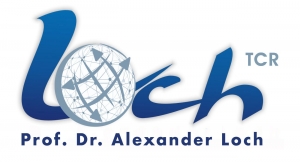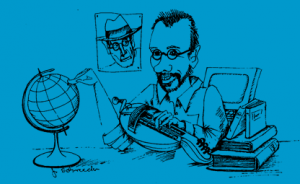ONGOING PROJECTS
Kommunale Interkulturelle Kompetenzen Stärken (Strengthening municipal intercultural skills )(KIKS) (2022–2025)
→ in cooperation with the Baden-Württemberg Ministry of Social Affairs, Health and Integration
The project “Strengthening Municipal Intercultural Competencies” (KIKS) is conceived as an ethno-psychologically grounded action research initiative. Its aim is to facilitate a participatory and in-depth engagement with both one’s own and other (administrative) cultures. The project’s primary focus is on facilitators/multipliers and „high potentials“ – particularly students/future officials in Public Management as well as selected third-country nationals. These groups regularly participate together in joint learning journeys, during which they engage in shared intercultural learning processes. Subsequently, they serve as so-called “admin-guides” in Baden-Württemberg, providing mediation in intercultural conflicts and offering pathways to peaceful coexistence among diverse cultures.
The central methodological approach of this action research project is the implementation of a series of intercultural premium dialogue formats involving both international/refugee and German participants. Within these formats, new intercultural knowledge is generated and elaborated. The qualitative methodology is akin to focus group work, but does not employ standardized stimuli or pre-arranged cultural dimensions. Instead, it centers on the lived experiences of the participants involved.
Between 2016 and 2025, in addition to German students and staff from immigration authorities, migrants from Syria, Afghanistan, Iran, Turkey, Guinea, Brazil, Uzbekistan, North Africa, Tibet, Indonesia, and Ukraine participated in the project. An accompanying study on intercultural “Best Practice in the Länd” (working title) is scheduled for publication at the end of 2025.
Perawat@Jerman: The migration of Indonesian nurses into the German healthcare system (2023–2026)
→ in cooperation with a team of Indonesian academics and nurses in Germany, funded by the Baden-Württemberg Foundation (BWS+)
In 2021, the German Federal Employment Agency (BA) and the Indonesian government (KemenP2MI) signed a placement agreement enabling Indonesian nurses (“perawat”) trained in Indonesia to access employment opportunities in the German healthcare sector. Participants acquire German language skills up to level B1 in their home country, receive intercultural preparation for living and working in Germany, and, upon their return – according to the “Triple Win” concept – are able to transfer newly acquired skills and knowledge back to their home country. In recent years, the number of Indonesian nurses coming to Germany has steadily increased, providing a unique opportunity to comprehensively capture the entire migration cycle: from the psychogenesis of the decision to migrate, through preparation, acculturation, integration, job satisfaction, and intercultural conflicts, to circular migration, reintegration, and development-related (side) effects.
The project PERAWAT@JERMAN (P@J) investigates the migration of Indonesian nurses to Germany within the framework of the international “Migration & Development” debate, employing a multi-method longitudinal design. The project aims to analyze the perspectives of migrating nurses in a differentiated manner and to derive evidence-based recommendations for the development of fair and sustainable migration policies.
Mega-Themes: German & Indonesian perspectives (2022–2025)
→ in cooperation with Universitas Indonesia (UI), funded by the Baden-Württemberg-Stiftung (BWS+)
There are future-oriented topics of existential global significance that are being intensely debated in both academia and politics. These so-called megatrends/megathemes include, among others, climate change, digitalization, migration, urbanization, artificial intelligence, sustainability, as well as the future of work and mobility (cf. OECD Strategic Foresight 2035).
Within the framework of a collaboration between the Ludwigsburg University of Public Administration and Finance (HVF) and Universitas Indonesia (UI), the project “Mega-Themes in German-Indonesian Comparison” aims to provide German and Indonesian students and researchers with a platform for in-depth, cross-cultural and cross-system dialogue on selected megatrends. The focus includes best-practice examples such as the European Green Deal, the Smart City Jakarta or European regulation of Artificial Intelligence.
An interdisciplinary edited volume, bringing together contributions from several joint learning journeys and international summer schools on these topics, is currently in preparation.
CURRENT TOPICS
Human capacity development, migration governance, transmission of values, immigration & integration, cross-cultural management, perspectivity, impact monitoring, intercultural didactics.
Research Networks & cooperations
–> Bonner Institut für Migrationsforschung und Interkulturelles Lernen
–> Netzwerk Fluchtforschung
–> Researchgate
–> Publications
COMPLETED PROJECTS
Human Capacity Development for Migration Governance (2020)
The Global Compact on Refugees (GCR) and the Global Compact for Safe, Orderly & Regular Migration (GCM) pose numerous new challenges for international organizations (such as UNHCR, IOM, World Bank) and national decision-makers. In cooperation with the GIZ, the research project Human Capacity Development for Migration Governance (HCD4MG) at the HVF investigates the question of how individual and organisational capacities are developed in selected countries in order to achieve a so-called ”triple-win effect” (for countries of origin, host countries and those seeking protection) and thus ideally also contribute to achieving the Sustainable Development Goals (SDG) of the United Nations. Central to this is the concept of (multi-level) ”migration governance”, which usually refers to processes in which politics, business, civil society, refugees, migrants and other interdependent actors are involved in government action in order to develop — and implement — coherent migration policies. The analysis of training scripts, participatory observation in capacity development measures and the systematic questioning of key actors in this context currently indicates that much of what has long been established as best practice in German Development Cooperation from advisory work with ministries, states and municipalities is being replicated; innovations (for example, in remittances management, ICT4refugees, the-future-of-work), however, are emanating precisely from countries such as Indonesia, Ecuador, Kosovo and the Global Forum on Migration and Development (GFMD).
Transmission of values in the youth welfare system of Bonn (2019–2020)
Almost 30% of the people in North Rhine-Westphalia have a so-called ”migration background”. At the beginning of 2019, 41,211 unaccompanied minors were living in Germany under youth welfare law.
Although their absolute number has been decreasing continuously since the end of 2016, after a phase of initial care, the socio-pedagogical, psychological and youth welfare experiences and issues concerning ”integration” and ”intercultural conflicts” in the coexistence of more than 40 nations are increasing.
The examination of values and norms within German society as well as the cultural perspectives of young people from different countries of origin is the starting point of this study at HVF. Reflections on ”value formation” (which is more profound than the mere ”mediation” of norms and values) will be developed in a participatory manner with the key actors in youth welfare and brought into exchange with interdisciplinary value research in the German-speaking world.
Action Research Projects
Intercultural changes of perspective of students and refugees: Black Forest (2017, 2018, 2019)
Flatbread or Swabian raviolis? The negotiation processes of students of administrative sciences and refugees from Syria and numerous other countries of origin, who have already reached A2 language level in Germany and who together in a Black Forest cabin enter into an in-depth dialogue on culture, integration, resistance, flight, de-Christianization of the Occident, modernization of Islam, cultural standards, etc., are applied research par excellence.
Development of teaching materials at the Instituto Cathólico para Formação de Professores in Baucau: East Timor (2002–2005)
For a long time, ethnologists have tended to do research on foreigners instead of entering into a dialogue with people of other cultures, which inspires each other and initiates development processes. In East Timor, following the country’s independence, the opportunity arose to work together with young local researchers not only to discover unique ethnographic material (e.g. on the sacred house reconstructions of the Makassae) and to observe the post-conflict processes in Asia’s least developed country (LCD), but also to make a sustainable contribution to the development of the country’s education system by establishing a teacher training institute (ICFP).
Film productions on intercultural communication in Chiang Mai, Thailand (1999)
In the VOP Studio, Chiang Mai, numerous films on typical Critical Incidents were produced in cooperation between Asian and German partners. Later films on intercultural communication in African, Oriental and South American contexts followed at the German Foundation for International Development.
With ships, buses & Trans-Siberian Railway from the edge of South East Asia to Paris
As is well known, detours increase the knowledge of the place. And if you want to reach your destination quickly, you should — so Confucius advises — go slowly. After three years in insular Southeast Asia, the rapprochement with Germany in 2005 took place slowly via Indonesia, Malaysia, Thailand, Laos, Vietnam, China, Mongolia, Russia and Eastern Europe. But the re-entry shock in the face of the introduction of the Euro during a longer period of absence did not fail to occur …





